How to stop biting behavior in French Bulldogs
Discovering how to stop biting behavior in French Bulldogs is crucial for a happy relationship with your furry friend. While biting isn’t common among Frenchies, starting training early helps prevent it.
French Bulldogs usually have a friendly nature and rarely bite. However, sometimes they might nip, which worries many owners of Frenchies.
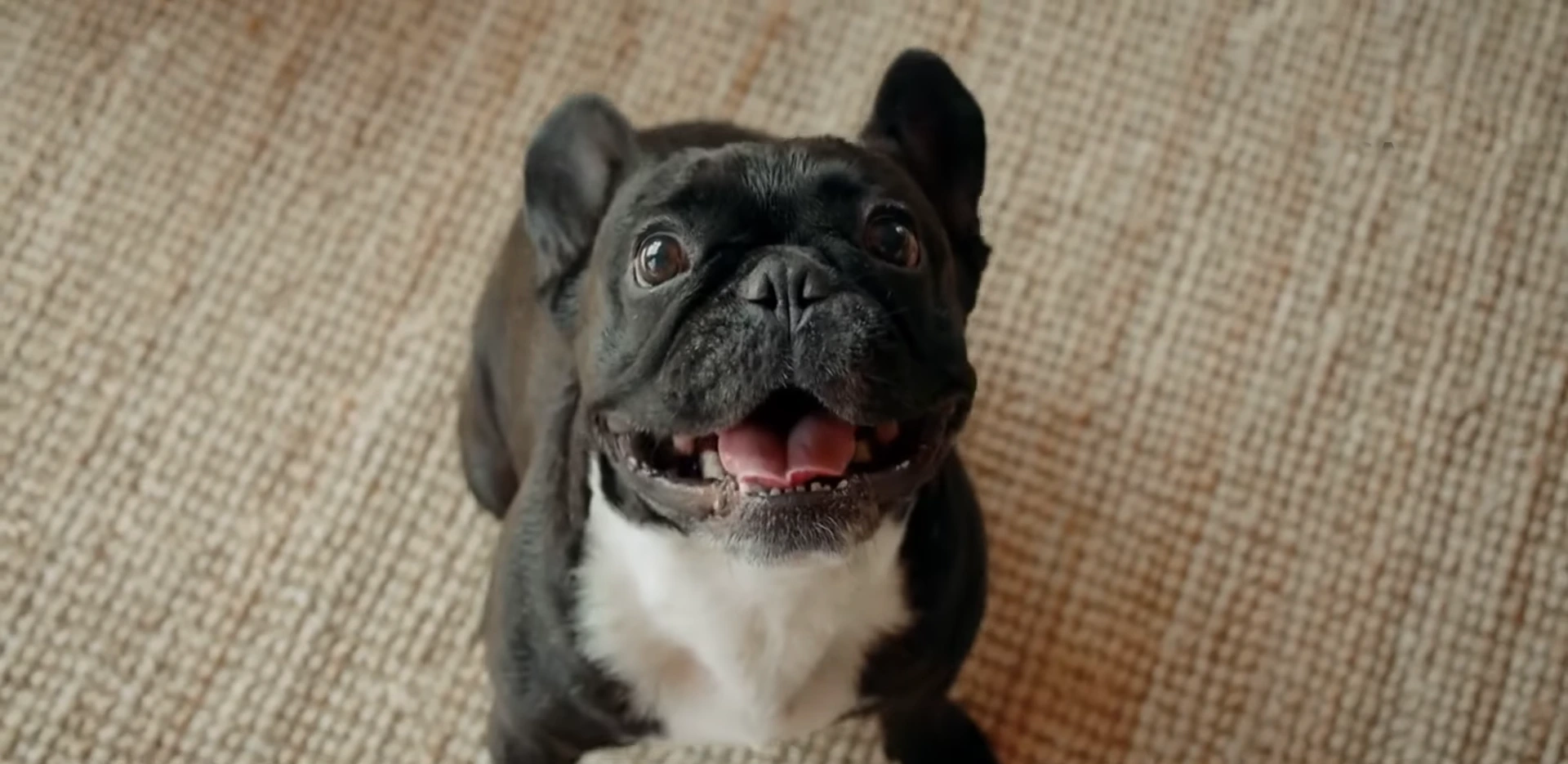
In this article, we’ll explore simple and effective ways to stop French Bulldog biting.
We’ll share tips based on personal experiences with our own Frenchie, Claude, who used to nip as a puppy.
We’ll also discuss successful strategies that helped our neighbor’s puppy stop biting, especially important for families with young kids. Join us to learn how to manage and prevent biting in French Bulldogs.
Understanding French Bulldog Bit Behavior:
Insights into Biting and What’s Considered Normal
French Bulldogs commonly display fear or occasional aggression during their lives.Often, they communicate their discomfort by giving a small warning bark, indicating a desire to be left alone.
If the boundaries aren’t respected, these barks might escalate into a growl, accompanied by the display of their small yet sharp teeth. Continued agitation can intensify the situation, leading to a snap or potential bite.
Usually, when feeling scared, most French Bulldogs might nip as a warning, aiming not to cause harm.
However, in the case of an older or more aggressive French Bulldog, such a bite could be significantly painful, especially concerning young children.
Do French Bulldogs bite frequently?
Initially, yes, as puppies, Frenchies tend to bite and nip, often as part of teething and playful behavior. However, typically, they tend to outgrow this behavior with time.
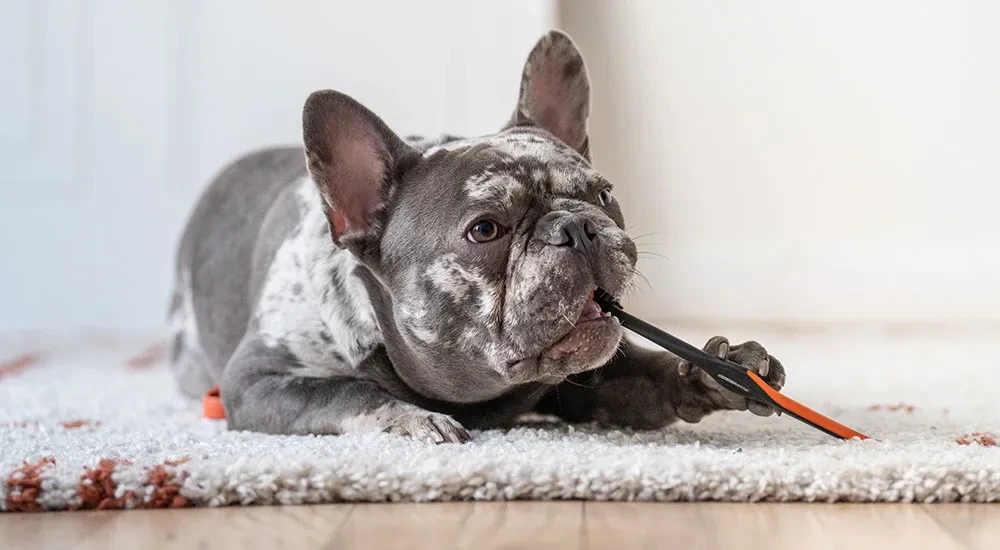
In general, French Bulldogs are characterized as a non-aggressive breed.
Much of their behavior is influenced by the training and upbringing provided by their owners. While biting may be common during their puppy phase, they typically transition away from this tendency as they mature.”
Understanding and Managing French Bulldog Puppy Biting Behavior
French Bulldog puppies often exhibit biting behavior, especially during their teething phase. This phase is when they explore their surroundings through gentle nips and alleviate the discomfort of their growing teeth by chewing on various items
Additionally, their playful nature might lead to overly enthusiastic biting during interactions, a behavior reminiscent of their playful interactions with siblings.
To tackle French Bulldog puppy biting issues, redirect their attention towards appropriate chew toys. It’s crucial to distinguish between playful behavior and aggressive biting tendencies.

Personal experiences highlight how playfulness can inadvertently encourage biting, requiring corrective training as the puppy matures.
Occasionally, these puppies might resort to biting as a means to establish dominance in the relationship.
Correcting such behavior becomes essential, as allowing this trend to persist may result in problematic behavior patterns in adult French Bulldogs.
Addressing puppy biting behavior promptly is crucial. Failing to do so might lead to the misconception that biting is acceptable behavior, posing challenges when they reach adulthood.
A Biting Adult French Bulldog Presents a Concern
An adult French Bulldog displaying persistent biting behavior poses a significant concern. If your Frenchie continues to bite into adulthood without outgrowing this tendency, it’s crucial to implement training methods to curb this behavior.
Additionally, if your adult French Bulldog suddenly starts biting without any apparent cause, seeking immediate veterinary attention is essential.
This abrupt change in behavior might signal an underlying illness or injury that requires prompt medical assessment to ensure your dog’s well-being.
How to Stop French Bulldog Puppy Biting :
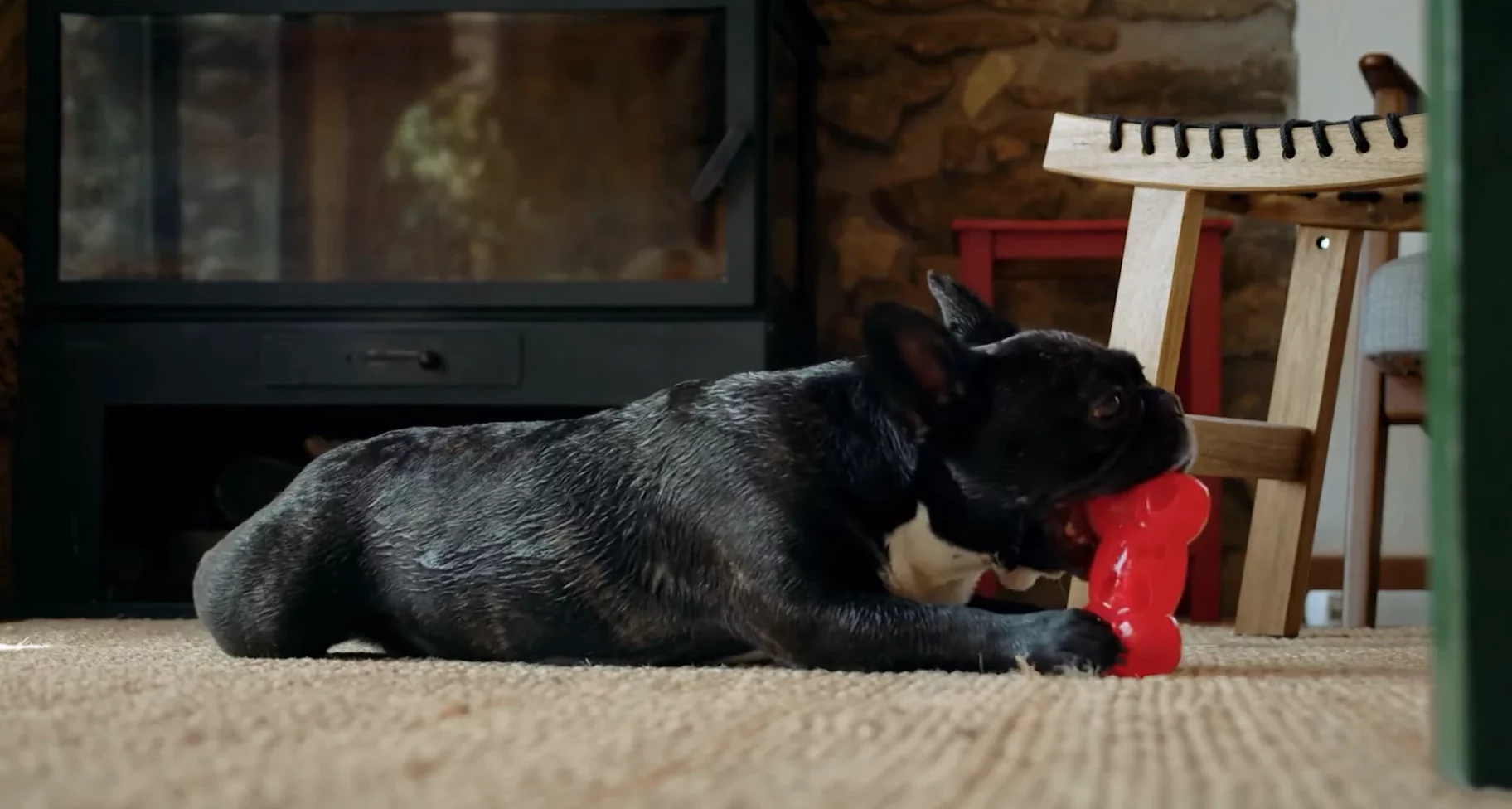
When dealing with a biting Frenchie puppy, swift intervention is key to curbing this behavior. Implement these strategies to effectively manage and prevent biting tendencies:
1. Employ Bite Inhibition Techniques:
Mimic natural puppy behavior by emitting a high-pitched squeal or using a firm “no” command when your Frenchie puppy bites.
This technique helps communicate that the biting causes discomfort, encouraging your puppy to refrain from biting.
2. Discourage Hand Biting During Play:
Avoid encouraging biting behavior during playtime. Refrain from playful pushes, wrestling, or running away, as these actions can inadvertently reinforce biting tendencies.
3. Apply Discomfort Techniques (if necessary):
Some trainers suggest placing a thumb under the puppy’s tongue and a finger under the chin for a brief moment after a hard bite. This technique might create mild discomfort, discouraging the puppy from biting further.
4. Use Bitter-Tasting Gloves:
Wearing gloves coated with a bitter substance can dissuade biting by making it an unpleasant experience for the puppy.
5. Redirect Biting to Chew Toys:
Substitute your hands with chew toys during play. This redirection helps the puppy associate biting with appropriate items, not human hands.
6. Address Foot Biting:
Prevent biting directed towards feet, shoes, and shoelaces by employing similar methods used for hand biting. Redirect their attention and discourage this behavior early on.
7. Avoid Physical Punishment:
Refrain from using physical force or punishment to correct biting behavior. This approach can exacerbate fear and aggression in your Frenchie.
8. Train Acceptance of Hands Near the Mouth:
Train your puppy to accept hands near its mouth for eventual dental care and other necessary interactions. Reward positive responses with treats and gentle handling.
9. Manage Food Aggression:
Train your Frenchie to accept food handling without exhibiting aggressive behavior. Gradually desensitize the puppy by briefly removing and returning the food bowl, praising non-aggressive responses.
10. Establish Authority:
Reinforce good behavior and discourage dominance-related behaviors. Offer rewards for compliance and use gentle redirection to establish your authority.
11. Facilitate Socialization:
Allow your puppy to interact with other dogs to learn acceptable behavior. Encourage socialization through supervised play sessions or puppy socialization classes.
12. Introduce to Noisy and New Environments:
Expose your puppy to various environments and noises gradually to minimize fear-related reactions, thus reducing the likelihood of aggressive responses.
13. Supervise Interaction with Young Children:
Monitor interactions between your Frenchie puppy and young children closely to prevent any potential aggressive behavior and bites.
Implementing these techniques early on can effectively deter biting tendencies in your French Bulldog puppy, fostering a well-adjusted and non-aggressive pet.
Risks Associated with Dog Bites
Dog bites, especially from adult dogs, pose significant dangers. Such incidents can lead to severe complications. Each year, people face fatalities due to dog bites, and infections resulting from wounds turning septic are more common.
Approximately 50% of all dog bites introduce bacteria into the body, including capnocytophaga, pasteurella, staphylococcus, and streptococcus, increasing the risk of infection and other complications.
Addressing a French Bulldog Bite
If bitten by a French Bulldog resulting in a bleeding wound rather than a mere abrasion, follow these steps:
Apply Pressure to the Wound: Gently press down on the bite wound. While this may induce bleeding, it can assist in removing bacteria from the area.
Clean the Wound: Use clean water along with a mild soap to thoroughly clean the bite wound.
Control Bleeding: Employ a clean cloth to apply pressure to the wound once more, aiding in slowing and stopping any bleeding.
Apply Antibiotic Cream: If available, apply antibiotic cream to the dog bite wound, then cover it with a new or sterile bandage.
Seek Professional Advice: In serious cases, contact a healthcare professional for further guidance and evaluation.
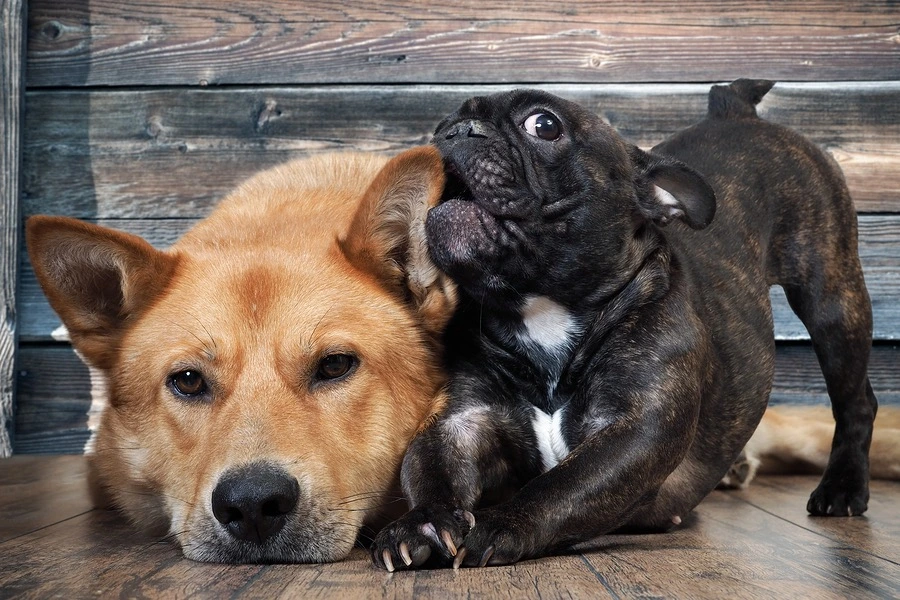
so we’ve delved into this comprehensive guide on managing French Bulldog biting behavior. From understanding the triggers of biting in Frenchies to effective techniques for both puppies and adults, we’ve covered quite a lot.
Remember, biting issues aren’t just a matter of inconvenience; they can pose serious risks, especially if left unaddressed.
Dog bites, whether from puppies or adult dogs, can lead to complications and infections.

So, knowing how to manage these situations and seeking professional help when needed is crucial for both your and your Frenchie’s well-being.
So, whether it’s redirecting their play, teaching bite inhibition, or socializing them effectively, the goal is clear – to ensure a happy, well-adjusted, and non-aggressive furry companion.
And remember, it’s a journey – a journey towards creating a harmonious relationship with your French Bulldog where biting behavior becomes a thing of the past, allowing you both to enjoy a fulfilling companionship.
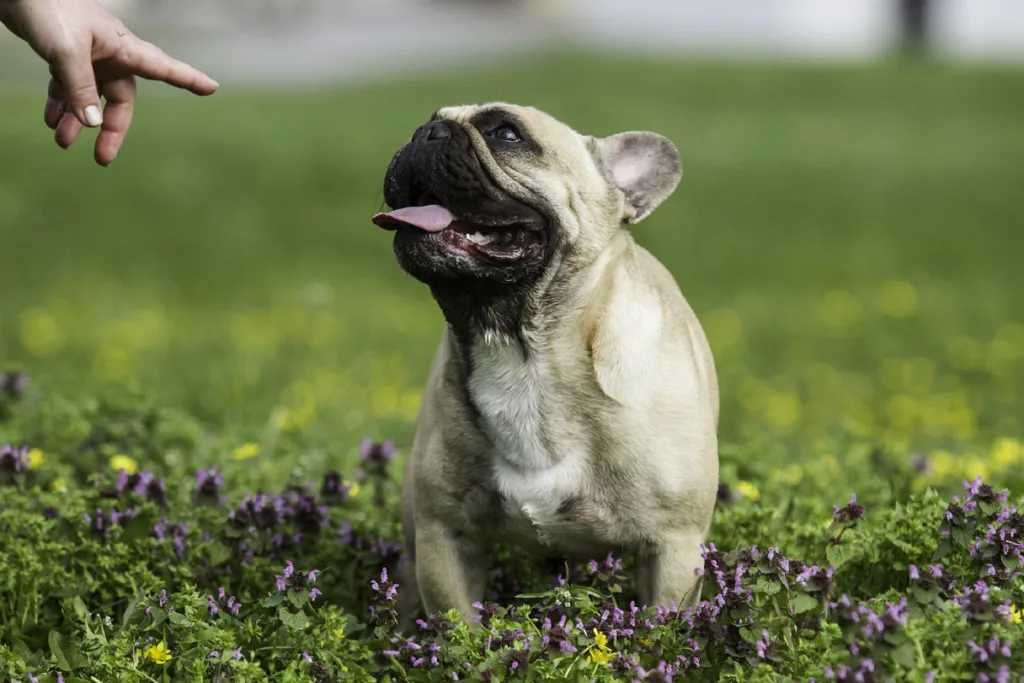
5. How can I prevent my French Bulldog from biting strangers or guests? Preventing biting incidents involving strangers or guests requires socialization. Expose your Frenchie to various people, environments, and situations early on. Use positive reinforcement to encourage calm behavior around new individuals.
6. Is biting behavior different between male and female French Bulldogs? Generally, biting behavior isn’t gender-specific in French Bulldogs. Both male and female dogs can exhibit biting tendencies, which can be managed through consistent training methods.
7. What if my French Bulldog bites during play with other dogs? Supervised play sessions with other dogs help in learning acceptable behavior. If biting occurs during play, interrupt the behavior by redirecting their focus to toys or by separating them briefly.
You may also like :
can french bulldogs eat dandelions
How do I keep my French Bulldog skin healthy?




